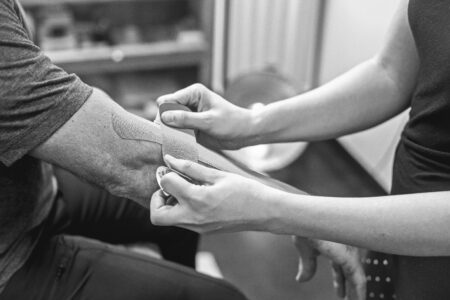The Unexpected Effects of Morning Habits On Health
- Updated on: Feb 6, 2025
- 6 min Read
- Published on Feb 6, 2025

Let’s talk about energy and the lack thereof. Did you know that the habits you develop in the mornings when waking up can influence your energy levels, mental clarity, and overall well-being? Some of these rituals become a part of who you are, and you don’t even realize you are doing them anymore. Things like grabbing your morning coffee, taking a quick shower, or going for a brief stretch before rushing out the door.

Cold Shower
Starting the day for some people with a cold shower is the ultimate punch of energy and an electrifying way to shake off sleep and to jumpstart your day. Whilst others crack at the thought of stepping into icy water first thing in the morning. But science says a lot about cold water or typical cold showers.
Taking a cold shower can stimulate circulation, promote blood flow throughout the body, and even activate brown fat, which plays a vital role in regulating body temperature. Now, research also suggests that a cold shower can trigger the release of endorphins, potentially boosting mood and helping you not to have that morning sluggishness you might feel or even mild anxiety.
But cold showers are not always so beneficial. If you’re already prone to stress or have elevated cortisol levels, exposing your body to an abrupt shock of cold water may actually heighten tension rather than alleviate it. So if you have sensitive skin, cold water might actually cause you more tension than relax or stimulate you. What works for one might not work for another.
Perhaps consider alternating. Where you alternate between warm and cold water. This way, you can experience both by having the benefits but without extreme shock, making it a more comfortable experience for you.
Coffee
There’s just something about that first sip of coffee in the morning. The warmth, the aroma, and the almost instant surge of alertness make it a cherished ritual for millions. But here’s something to consider—your body naturally produces cortisol, a hormone responsible for wakefulness, which peaks about 30 to 60 minutes after you wake up.
Drinking coffee too early can disrupt this natural rhythm, essentially teaching your body to depend on caffeine rather than its own built-in wake-up system. Over time, this habit can contribute to energy crashes, an increased tolerance for caffeine, and even disturbances in your sleep cycle.
Try postponing your first cup of coffee by about an hour after waking. This small change allows your body to wake up naturally, making coffee and drinking it is an added boost to your energy levels rather than a crutch. This might seem simple but it’s an adjustment that can make a big difference
Hydration
After six to eight hours of sleep, your body is naturally dehydrated. People overlook the important role hydration plays in maintaining energy and focus. Even mild dehydration can lead to sluggishness, headaches, and reduced cognitive function. Skipping water in favor of coffee can leave you feeling much more tired as the morning progresses. Drinking a glass of water first thing can kick-start digestion and help prevent a mid-morning energy drop. Water helps flush out toxins and boost metabolism. You could also try incorporating a pinch of sea salt or a squeeze of lemon to replenish electrolytes and further support hydration.
If you are feeling fatigued more often than not despite getting enough sleep, using a Symptom Checker can help identify whether dehydration or vitamin deficiencies could be contributing to your persistent lack of energy.
The Stretching Misconception
You’ve probably heard that stretching first thing in the morning is great for flexibility, but that’s only one part of the story. Morning stiffness is a real issue caused by hours of inactivity while you sleep. While a few quick stretches might offer some relief, they often aren’t enough to fully prepare your body for the day ahead.
Your muscles and joints tighten overnight due to the lack of movement, which can end up in reduced mobility when you wake up. By only doing specific stretches, you may not effectively activate your nervous system or completely engage your muscles. Instead, incorporating light resistance exercises, controlled mobility drills, or low-impact activities like tai chi can assist with flexibility while also improving circulation and coordination. Moving shortly after waking helps lubricate your joints, boosts blood flow, and gets your body ready for the day’s physical demands. A balanced morning movement routine assists with easier transition from rest to activity and helps lower the risk of injuries throughout the day.
Dynamic Movement
Instead of relying solely on static stretching, dynamic movements, such as yoga, mobility drills, or even a short walk are far more effective in getting your muscles, joints, and circulation going. Think of it like warming up a machine before putting it into full motion. That doesn’t mean static stretching is useless, it just works better later in the day when your muscles are already warm.
Deep Breathing
Many people underestimate the profound impact that deep breathing in the morning has on your overall health. A few minutes of intentional deep and focused breathing exercises can help release stress, increase oxygen flow to the brain, and establish a calm and relaxed tone for your day. Techniques like diaphragmatic breathing or box breathing can be particularly beneficial for those who experience morning anxiety.
Morning Walks
A quick walk in the morning offers much more than just a simple workout. It plays a crucial role in regulating blood sugar levels, sharpening mental clarity, and promoting healthy digestion. Even a brief 10-minute stroll outdoors can provide a noticeable energy boost and elevate your mood, thanks to increased oxygen intake and exposure to natural light.
Digital Detox
Reaching for your phone immediately after waking up can set you up for stress, information overload, and a reactive mindset. Instead of starting your day on autopilot, try delaying screen time for at least 30 minutes. This allows your mind to wake up gradually, giving you the chance to focus on your well-being before diving into external demands.
Morning Stress
Most people don’t realize just how much morning stress can shape their entire day. The way you start your morning has a direct impact on your nervous system, influencing how your body responds to stress for the rest of the day.
Simple Adjustments That Help
Prepare what you need the night before to reduce morning chaos and perhaps take five minutes for deep breathing to calm your mind and regulate your oxygen flow. It’s very important to avoid checking your phone first thing in the morning, as this prevents an immediate flood of information from putting your brain into a reactive state.
Morning Light
Exposure to natural light in the morning is essential for regulating your internal clock. Sunlight helps control melatonin levels while increasing serotonin, which boosts mood and escalates your focus. Early morning sunlight exposure has been linked to improved cognitive function, better emotional balance, and more restful sleep at night. On top of that, catching up some early sun supports healthy vitamin D levels, which play a vital role in immune function and bone health.
Spending more time outside in the morning can be a great solution, by taking short walks, doing some jumping jacks or lunges or even just enjoying your coffee outside or by the window. Natural light will help reinforce your circadian rhythm and boost alertness in your brain and body. Perhaps if you don’t have access to natural light, then using a light therapy lamp can stimulate the effects of sunlight and make you more awake than not being around any light for that matter.
Morning Mindset
Your mental approach each morning absolutely sets the tone for not only your day but also, sometimes, the day of people around you. Practicing gratitude, setting daily intentions, or engaging in mindfulness can change your outlook. A gratitude journal is a great way to start your day and set the intention for the day. Starting your day with a grateful mindset is a lot better than starting it by thinking how many unread emails are lying in your inbox. Taking just a few minutes to center yourself can have lasting effects on your focus, your emotional balance and everyone around you.
Starting your day with positive affirmations or writing down your thoughts can help shift your perspective and reduce stress. Visualization techniques, such as picturing a successful and fulfilling day ahead, can increase motivation and confidence. Deep breathing exercises and meditation can help regulate emotions, creating a sense of calm that carries through the day. These small but meaningful mental practices lay the foundation for improved productivity, emotional resilience, and overall well-being.
Consistency
The thing that is so crucial and important to a successful morning routine is consistency. By figuring out what your regular wake-up time is, following a specific routine, especially in the morning and aligning all your habits with your personal goal can really assist with stability and just your overall success. Constant repetition of these practices will lead to a fulfilling day started in an intentional way.
Maintaining consistency helps build resilience, when unexpected challenges arise, your established habits can provide a strong foundation to keep you on track.












